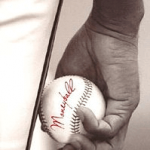
The central premise of Moneyball is that the collected wisdom of baseball insiders (including players, managers, coaches, scouts, etc.) is subjective with statistics such as battering averages and stolen bases used to weigh player value. The movie is based on the true story of the Oakland A’s manager, Billy Beane (Pitt), who, when faced with the reality that his team has a budget less than a third of that of the Yankees, for example, pursued a new strategy for putting his team together.
Rather than stick with fellow baseball know-it-alls, Beane opts to hire Peter Brand (played by Jonah Hill), a Yale economics grad who proposes a new system for selecting players, one that involves statistical analysis rather than studying videos of potential.
Without ruining too much, many predictable obstacles ensue: Beane is told he’s crazy. He’s told this will never work. He’s told he cannot change the game. That the old way of playing the (player-selection) game has been the same basically forever, and it’s a system that works. It’s a tilted system that favors the more economically inclined, but it’s the way it’s always been.
When I was thinking about the film afterward, I realized the new strategy displayed could be likened, in many ways, to the evolution of social media. Social media has shaken up the public relations, marketing and customer service worlds. It was approached cautiously at first, and to much skepticism. Why change traditional marketing and PR? They work. They function in a way that they’ve always functioned.
Yet, as we all know, even though traditional methods did, and do, still work, incorporating in these new options also works. And with a lot of tweaking (Beane adjusts his team several times), it can produce something really amazing, and reap the same kinds of benefits that those who still play the game the old way have amassed over the years.
Like with baseball, social media has helped even an uneven playing field …






Yes the tweaking is really the secret sauce. There is no magic formula that is one-size fits all. Each company is different and while there are general guidelines it’s important to make social media work for your company and its specific way of doing business with its customers and its product line up.
Great insight.
I think moneyball can be used in a lot of different contexts in business which is nice and I see the correlation.
JMM
As newspapers decline, the methods of traditional PR did as well. Social media has now invigorated communication and as a PR professional, I love all the new tools we have to share messages. I’m glad you liked Moneyball. I loved the book and will venture out to see the movie. Great post and spot on insights.
Sounds like a great book and film! Totally agree with Denise that there is no magic formula that is one-size fits all …
I just want to see Pitt looking all suburbian Dad-like in the flick. 😉
We can learn a lot from Billy Beane! He pulled off some pretty impressive stuff!
Social media is a great form of influence. One of the big differences between online marketing (all kinds, not just social media) and traditional marketing is that it’s much easier to compile a wealth of information. You can know exactly how many people saw an online ad, or how many people retweeted something you wrote. This kind of data can be invaluable, but still requires know-how to use it and take action on it.
Great post. I might just have to see MoneyBall.
Thanks, Jeff. Great points. And I definitely recommend MoneyBall — great story, very human characters, etc.
Definitely! Thanks, Max.
That’s an entirely justifiable desire 😉
Thanks for the comment! Let me know if you end up watching it.
Thanks, Cindy. I appreciate your perspective as being from the PR world and having watched the evolution. Hope you enjoy the film as much as the book.
Yeah, it definitely can. Thanks, Jessica!
Definitely! Love the “there’s not one-size-that-fits all” explanation — so many try to apply a single (idea) to a certain topic, when really, everything is contextual and each situation is different.
Great post Debbie. I love how you used the movie as inspiration for this post. Great posts often come from outside our line of work. Being involved in social media, you have a certain lens that you view the world… and that is fascinating when you start comparing it to things we can all relate to. I’ve been meaning to see the movie, now I want to see it even more!
Thanks, Matt. It’s a great movie, you should definitely check it out if you get a chance.
I haven’t seen the movie yet but am really looking forward to it. I will certainly view it with interest after reading your post. Thanks for sharing.
We are in a transitional phase, which calls for a transitional approach incorporating both legacy and digital media. I wouldn’t be too quick to throw out the baby with the bath. Things are changing in such rapid and unexpected ways, early adoption does come with it’s own set of unique risks and rewards. Smart marketing has always been, and will likely continue to be, a series of considered decisions rather than knee jerk reactions.
Nice piece, great analogy. Thought provoking.
We’re in a transitional phase which calls for considered use of both legacy and digital media. Nice piece, great analogy and thought provoking. Thanks!
So… how do you really feel Stacey?
Hope to see this film soon. Good movie + Brad Pitt = Win!
Hi Debbie,
Interesting how statics and other data metrics can be used to make decisions across a range of activities, whether it be sports or marketing. What I was also struck by in reading your post was how storytelling follows a similar arc, not matter the subject. See Joseph Campbell’s seminal work, “The Hero’s Journey” for the common themes in all stories, whether they’re told in movies or marketing. I’ve heard some good things about “Moneyball,” now I’ll have to go see it sometime. Thanks!
Definitely! Did you end up being able to see it?
Yeah, there was definitely an interesting parallel. Love your point about storytelling, too. Did you end up catching the film?
I haven’t seen it yet but it’s on my list! (I think it’s in between theaters and DVD.) [btw: *statistics* not “statics”]
Sure. Let me know if you ever end up seeing it!
Thanks for the insightful comment, Rick!